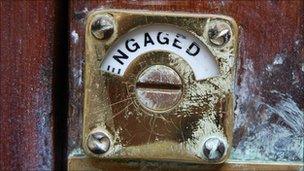Where can you go to the toilet?
- Published
- comments

Some places lock their toilets to avoid vandalism
One council is shutting all but one of its public toilets, so where in the High Street can you go to the loo these days?
People often employ one of two strategies when using toilets in commercial premises, having entered with no intention of buying anything.
In pubs, the non-patron toilet user may pretend to look around the pub for a few seconds, as if for a friend that is due to be met, before heading to the toilets.
In a fast-food restaurant, a quick scan of the menu before heading to the loos at least suggests you might be about to buy some chicken nuggets when you've finished with the conveniences.
These situations arise because the public toilet is in long-term decline. Manchester City Council has responded to the need for cuts by shutting 18 of its 19 remaining toilets. If you can make it to Mount St, where the town hall extension is, you'll be able to go. If you can't, you'll just have to hold it in.
Since the boom years of the late Victorian era, when public conveniences sprang up everywhere, there has been a change. In recent decades public toilets have become run down, unloved, targeted by vandals and increasingly prone to closure by councils looking for cuts.
"Over the last 10 years or so we've lost about 40%," says Clara Greed, professor of inclusive urban planning at the University of the West of England, and an expert on public toilets.
"Toilets aren't compulsory. They are always one of the soft options to cut, it has been endless decline. There is very little understanding of the value of toilets. Areas that have got public toilets attract more shoppers. People can stay."
Women, disabled people and elderly people feel the most angst over the toilet drought. And many people are shy about cheekily using toilets in shops, restaurants, bars and pubs.
So which High Street names are happy for you to use their toilets?
John Lewis, for one. All of their 28 department stores have toilets, with 112 at the biggest branch in Oxford St. They are for customers and non-customers alike. There's an obvious positive as you trawl through the shop on the way to the loos, says a spokesman, with the "reason being to try and drive footfall and turn people into customers".
There's a bit more ambivalence at most High Street names. But McDonald's sounds promising.
"Strictly speaking, the toilet facilities are for McDonald's customers only," a spokeswoman says. "However, the restaurant manager is unlikely to take exception to potential customers using the toilet unless it's felt that the use of the facilities by non-customers is hindering paying customers at any given time."
McDonald's have always been seen as a major public toilet provider, particularly in the US, notes Prof Greed.
KFC are less than outraged by the prospect of toilet users not subsequently buying a Zinger Tower.
"The toilets are there for the paying customers, but clearly this is going to happen sometimes," says the spokeswoman. "It's at the store's discretion, but it's always best practice to ask the manager."
Burger King is on a franchise system, so toilet policy will vary from outlet to outlet.
And in the pub world there's also inconsistency. Of its "managed" pubs, Punch Taverns national operations director Alan Morgan says: "We aim to treat any visitors to our premises in a welcoming and friendly manner and do not actively discourage members of the public from using our toilet facilities.
"However, the final decision is left to the discretion of our general managers who will take into consideration the location of their pub, for example, if they are located in a high footfall area where it might impact our guests and the availability of alternative community facilities."
But for the chains "leased" pubs, the decision is down to individual licensees.
Enterprise Inns says its licence holders have the ultimate decision, although the group is sympathetic to non-customers.
JD Wetherspoon says its pubs do not have signs to discourage non-customers from using the loos.

Some people are shy about covertly using pub and restaurant loos
"We are fairly open-minded," says a spokesman. "If someone walked into the toilet, didn't buy a drink and walked out we wouldn't go chasing after them."
But, of course, many people would be too shy to march into a pub or fast food restaurant they weren't planning to patronise and use the conveniences. And there are many places that lock their toilets as a precaution against vandals. Disabled people have a national key scheme from Radar, external that gives them access to 8,700 locked disabled toilets.
But the main problem is that pubs and fast food restaurants are not everywhere.
Further reading
The Independent's leading article, external says closing public toilets is a sad reflection of our society. "The provision of clean and convenient public loos, for a modest charge or preferably free, is the hallmark of a civilised society and one that treats people, including visitors, with dignity." The paper goes on to say: "The Victorians knew this; some time in the last few years, the guardians of our towns and cities managed to forget."
The Guardian's Simon Jenkins, external says the move is predictable in the era of spending cuts.
"Though overall resources available to councils are nowhere down by more than 9%, Doncaster is cutting half its libraries. Manchester is closing all its public toilets bar one, Wakefield is slashing its staff by a tenth. Most councils are taking a savage axe to many of the 200,000 extra staff (out of three million in total) taken on since 2000, and butchering grants to the voluntary sector."
The last word goes to Richard Chisnell, chairman of the Loo of the Year Awards. He says in This is Lincolnshire, external: "Toilets are what it's all about. We're in danger, with all the cutbacks and doom and gloom, of losing our basic front-line services such as toilets.
"However bad the cutbacks, people aren't going to stop needing the toilet."